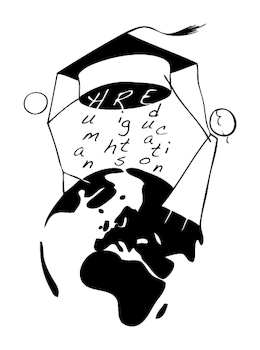Toolbox — For Training and Youth Work
All new tools in your inbox: Be the first to know about new tools for learning with our e-mail notifications.
Simulation Exercise
Human Equalities and Possibilities
To get involved into situation of people from different social groups and social status. With this involvement participants express the attitudes of the society towards different social groups. These attitudes are then analysed and discussed in terms of equalities and possibilities of human.
Description of the tool
Small paper with the description of the role is disseminated to the participant. Participants are asked to empathize in their roles. Various questions about regular life situations are asked and if the answer of the role to the participant’s opinion would be “Yes”, he is asked to go one step forward on (one step of the ladders on the ground). If the answer about regular situation to participant’s opinion is “No”, he stays at the same spot of the ladders.
The roles disseminated could be i.e. single father, disabled person, famous model (from Ghana vs. from USA), prostitute with HIV/AIDS, homosexual person, student, teacher in small village and in city centre, old woman, successful lawyer, emigrant etc.
The regular live questions could be i.e.: would it be easy for you to get a loan in the bank? Would you be easily hired in your desired job? Would you be allowed to adopt the child? My profession is respected in my society? Would I get some help from my neighbours? Do I have enough resources to feed myself and my family? Do I have enough friends that I can rely on? etc.
Participant playing their roles are asked to confirm if this simulation could be as a mirror of the reality? Does it happen in their real life? Could these situation be met in their societies?
Results: participants playing the roles will act according to their real life experience: people are equal, but in the society they have different possibilities. They will exercise practical situation that happen in their societies. Participant then will stress the inequality of people in practise, will realise the scope of such HR violation.
Disclaimer
SALTO cannot be held responsible for the inappropriate use of these training tools. Always adapt training tools to your aims, context, target group and to your own skills! These tools have been used in a variety of formats and situations. Please notify SALTO should you know about the origin of or copyright on this tool.
Tool overview

http://toolbox.salto-youth.net/1251
This tool is for
5-10 participants or more
and addresses
Social Inclusion, Disability, Anti-Racism, Intercultural Learning, Gender issues
It is recommended for use in:
Action 3.1 (Cooperation with the Neighbouring Partner Countries)
Materials needed:
Thread/rope, chalk, scotch or other tool to create a symbolic ladder for all participants.
Small sheets of paper to write down the description of roles.
Duration:
30-60 minutes (including the analysis of the results)
Behind the tool
The tool was created by
Wojtek, Dorota, Ani and Olivier
in the context of
Human Rights Education
The tool has been experimented in
Training course on Human Rights education
The tool was published to the Toolbox by
Unknown (on 26 November 2010)
and last modified
26 November 2010
Comments
No comments have been posted yet.
If you want to comment on this tool, you need to be signed in with your MySALTO account. Sign in now